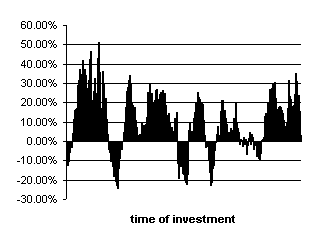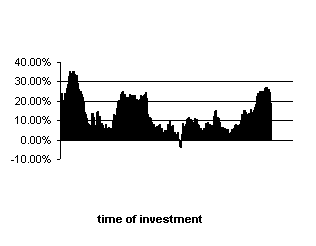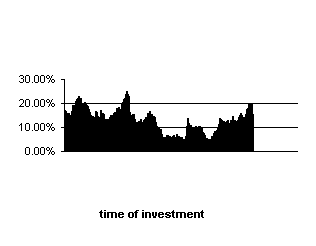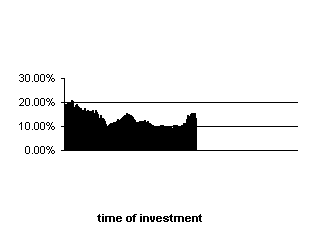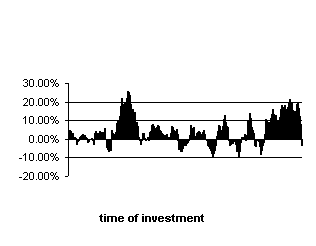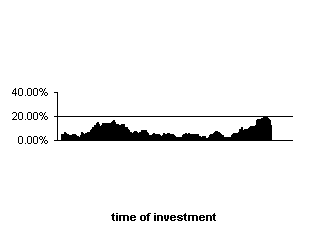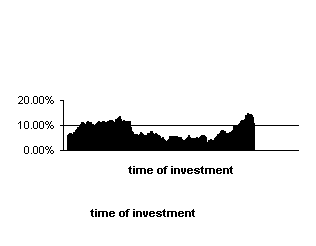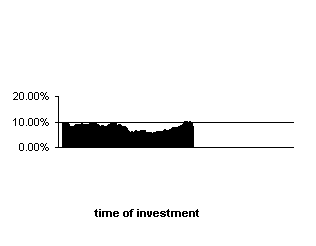Contents:
- Magellan: Success story with casualties
- Oh, those journalists! - media, psychology and investor behaviour
- Chaos: journalism or science?
- What do you read out of these charts? Ranking of alternatives
- ‘’To hell with all these risks! I want security. - Think again, and think of these solutions
- The case for index funds - Is it badmouthing astrologers to compare stock pickers to them?
- …Beware! it might be a sales pitch
- When will the government pay the promised contribution to RESP plans?
- Reward for diligent readers!
1, When Magellan, Portuguese navigator, sailed out from Seville in 1519, he had 270 men on his three ships. His undertaking turned out to be the very first successful attempt to circumnavigate the world. However, there were some grievances as well. It was a long term, three year venture. Only one ship returned with less than 20 men on board. Magellan himself was killed in the Pacific.
A few centuries later, there was another highly successful venture with the name Magellan, but also not without casualties. Magellan Fund, from Fidelity Investments, the largest mutual fund company in the world, was one of the most successful mutual funds in the 60s and 70s. It produced an 18% annual compound return for 18 years. (None of the more than 1900 mutual funds that are available in Canada today can boast of even a 17 % track record over the last 15 or 20 years.) However, the average investor putting money into this wonderful fund achieved only a 1% loss per year. Why? Because of buying and selling at the wrong time. These losers tried to catch ‘The Very Best’ moments of the volatile markets, because the old common sense law of "buy something at low price and sell it at a high price" looks so convincing. In reality, at least with stocks, it is a mirage, or a rainbow, … attractive but elusive. How much would these people have lost, had they invested in individual stocks and not in a mutual fund, where at least some of the volatility of the markets is balanced out?
2, The same phenomenon, selling rather than buying when there is a market correction, has been demonstrated in recent weeks. The media, as usual, has contributed to the herd mentality. As a renowned journalist admitted, when he got into the business, the basic law of journalism was explained to him like this: first oversimplify, then overblow! A good metaphor for how market changes are dealt with is that the media focuses attention on the yo-yo, not on the person who, while climbing a stair, is making it dance up and down.
The cyclical movement of the stock markets is linked, even if not closely, to the cyclical movement of the economy. In concert with the market cycles, there is a definite pattern of prevailing emotions as well. This emotional cycle looks like this:
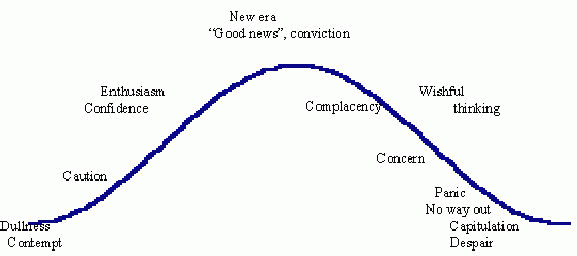 |
3, Is it just our individual psychological make-up, or the ‘herd pressure’ that makes rational financial decisions so hard? Probably not. Scientific studies, and the events of an increasingly interdependent world are building up evidence that all the traditional knowledge is insufficient to understand our world and make decisions accordingly. In other words, talking about complexity and chaos is not just one more example of that exaggerating nature of journalism. It is really out there, and it really affects us. The world economy and financial markets have never worked with the predictability of clocks. Today, however, we are witnessing more and more self-reinforcing cycles, sudden changes in the behaviour and cause-effect relationship of things that defy previous understanding. A well-known recent example of this was the avalanche in South East Asia, triggered by devaluation of the bath, the Thai currency, last year. And there are more and more such surprising ‘hot buttons’. As Time magazine put it, while an integrated global market was supposed to reduce volatility, what is happening is just the opposite,. "There is still a herd mentality, only the herd has got very big and dangerous."
4, Please spend a few minutes to compare some investment choices, and explore your preferences. Below, you can see historic data for eight investment alternatives within the 1987-1998 period. The eight charts show the annualized compound returns from single payments into these investment alternatives, if they were made at various times, - more specifically, at the end of the months. In other words, if you selected alternative (a) at the right moment, your annual return could have been more than 50 %. However, if you had made the same investment at some unfortunate moment, perhaps only a few months later, you could have lost more than 20 % annually. If, e.g., you had made the investment at the time indicated by the broken vertical line across alternatives a, c, e, and g, the annual returns would have averaged about -16, 10, -2, and 5 percent, respectively. How would you rank the attractiveness of these investment alternatives? First make your choices and then click here.
|
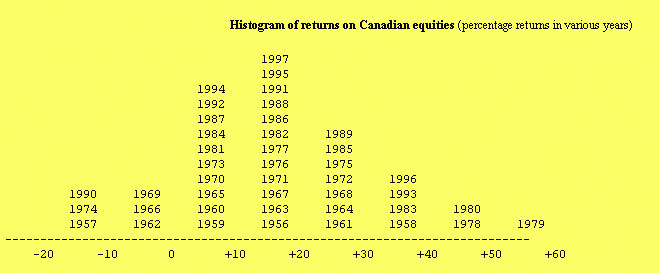 |
5, …‘What the heck has all this got to do with me?’ - you might ask. ‘I do not care about theories at all, and especially not about complexity theory.’ Well, of course, most people don’t, … even if, as someone wisely commented: there is nothing more practical than a good theory. But even if you are not going to be a student of complexity theory, or are not even enthusiastic about it, it will be to your advantage to be at least aware of its existence. Equipped with this awareness you can better appreciate systemic approaches to managing your finances, thus increasing the chance of avoiding costly mistakes from bad decisions. The sooner one realizes that managing investments is a profession, the better off one is. It is not that financial professionals are infallible. Far from it! But their special education, experience, up to date and comprehensive information sources, and full time devotion to this job give them somewhat higher chances to perform well in financial matters than a laymen would do. Do you think those investors who ‘managed’ to achieve loss with even the Magellan Fund heeded professional advice?
Many people react to the volatility of the market by basically avoiding investments. They become GIC savers. The problem with this type of saving, however, is that, due to taxflation (the combined effect of taxation and inflation, many people tend to forget about), it is almost impossible to achieve those long term goals (decent standard of living, paying for education, etc.) most of us strive for. Do you know / remember, e.g., that a litre of milk cost 35 cents in 1966? A dress shirt was $7, a litre of gas 11 cents then. When planning, it is always the purchasing power of the money that matters. Taxes tend to erode savings/investments too. Tax-sheltering and other tax-reducing and deferring strategies are therefor fundamental. With GICs, the risk of volatility is not removed, it is only transformed into the risk of losing / not accumulating enough purchasing power. Briefly, for long term goals, the way is investments, not savings. This is why deciding on your time horizon is so crucial.
Dealing with market volatility, for Warren Buffett, probably the most successful investor ever, the fundamental question is: Are you a net investor, or a net disinvestor? "Only those who will be sellers of equities in the near future should be happy at seeing stocks rise. Prospective purchasers should much prefer sinking prices" - said Buffett in March 1998. Markets fell dramatically during the summer, so maybe today is the perfect time to invest. But can we know for sure that we are already at the bottom, the ideal time to invest? There is no way of knowing. What seems to be important is that the short term ups and downs of markets (even within a day) have become more extreme. It is exactly this market volatility that dollar cost averaging was invented for. Dollar cost averaging turns volatility to our benefit.
A few companies have created RRSP eligible special funds, whereby an initial investment into a short term bond portfolio or money market fund is gradually, automatically invested into funds of the client’s choice on a regular basis, e.g. on Mondays, without extra fees. (By the way, do you know that the month October and the day Monday tend to be the worst in financial markets, - or, in Buffett’s interpretation, the best for investing?)
Another timely innovation of somewhat similar character was the recent launch of a segregated fund, where an inherent weakness of most segregated funds, namely, the dilemma of what point in time to pick as the lock-in date in order to maximize your investment gains, was removed. With this new seg fund, there is an automatic daily reset to guarantee the highest net asset value at maturity, a terrific thing under today’s circumstances, I think.
6, There is an interesting article in the July 6 issue of Fortune magazine. It’s an account of an American money management firm, DFA, run according to the research findings, and with active involvement, of some top economists, past and prospective Nobel Prize winners among them. The essence of the academic research applied is that stock pickers, however smart and diligent they might be, cannot consistently beat the market. The increasing acceptance of the underlying theory (of efficient markets) is reflected in the increasing popularity of index funds, first introduced in 1975. Almost a quarter of American pension assets are invested in index funds today. DFA concentrates probably the highest caliber scientific minds in the field. Due to the usefulness of scientific research, their funds (built also on research showing (a) the higher volatility but also higher potential of small cap funds as opposed to large cap funds, and (b) the ratio of price to book value as the strongest predictor of subsequent stock performance) have outperformed the S&P500, and even the other small company stock indexes.
A big advantage of index funds, some of them offered by insurance companies in Canada, is their low expense ratios. Of course, using index funds does not make it unnecessary to pay attention to the time horizon and the risk taking willingness of investors. Diversification is important even with index funds. (By the way, the ‘father’ of diversification theory is also involved in DFA as an advisor.)
However strong the scientific and historic evidence against stock picking might be, in closing, the article acknowledges that it is hard to overcome the temptation to try to pick the next Microsoft or legendary fund manager Peter Lynch. One of the DFA celebrities, Nobel laureate Merton Miller admits indulging in the ‘guilty pleasure’ of stock picking for himself sometime. But, as he says, he does it ‘strictly for entertainment’.
7, Some people do not buy critical illness insurance, because they think that stroke, heart attack, cancer, and the other dreadful conditions covered by this new type of insurance will always hit others. Even if they turn out to be wrong in their optimism, and become the victim of such an illness - the reasoning goes - they will not need insurance benefits because they can use their own savings/investments for the extra expenses and replacement of missing income. Well, some people obviously have assets that can cover the tens or hundreds of thousands of dollars that might be needed. In most cases though, all those assets are designated for other purposes, and the use of them to pay critical illness-related medical and other expenses can be painful. But this is a choice of preferences and risk taking to be made by the individual, of course. However, there is an issue related to the ‘self-insuring’ alternative that is worth consideration. Tax must be paid on cashing many types of assets. With a particular life insurance policy, all the investments linked to that policy can be paid out tax-free to the owner when a critical illness occurs. If that life insurance policy itself is not deemed to be needed, this arrangement will not look very attractive either, of course. However, especially for people who can realistically rely on their own assets in case a critical illness hits them, some life insurance policies offer much more advantage than what most people are aware of. Therefore, exploring the issue can be a good idea. For other people without substantial assets for a critical condition emergency, the issue remains that of taking the risk or preparing with a ‘normal’ critical illness policy.
8, As probably most parents and grandparents are aware, the federal budget in Feb 1998 introduced a new, important form of helping families with goals of accumulating money for post-secondary educational purposes. Education costs have already skyrocketed (11% a year in the 90s), but the trend is going to continue. The cost of a four year program for kids who are born today will easily approach six digit numbers. This year, the contribution limit to Registered Education Saving Plans (RESPs) was increased (to $4,000 annually, with a lifetime limit of $42,000), and the government promised to provide a Canada Education Savings Grant (CESG) of 20% on the first $2,000 in annual contributions for children up to age 18.
Though RESP contributions are not tax-deductible, within an RESP, the money grows tax-sheltered. The basic idea is that when the student begins to use the accumulated amount for education, he/she will pay low / no tax because students are usually in a low tax bracket. If the child doesn’t attend post-secondary education, another child can be designated, or - under certain conditions - RESP income can be transferred to the subscriber’s RRSP. Apart from these basic rules, several issues regarding the implementation / administration of the CESG were not clarified for months after the budget announcement. People who have paid their annual contribution are waiting for the promised grant from the government. Recently, it was declared that the CESG will appear in RESP accounts by mid-November.
Another strategy to save and invest for the education of a loved one is opening an "in trust for" account. There is no CESG going with this option, but there are serious tax advantages, and more flexibility than with RESPs. Which strategy is the better one? It depends on the particular circumstances of the family.
9, If you took the trouble of reading this far, you certainly deserve some relaxation. How about completing a few proverbs? You are not the first to try this game. In the first column below, you will find the beginning of the proverb, and in the second column, you will find what some small kids allegedly added to it. Can you come up with better endings?
|
|

Top page (on personal financial planning)
Key areas:
Life and health insurance (including disability, critical illness, and long-term care protection)
If you are / have ...
|
These web pages are for information purposes only. The information contained and presented, while based on and obtained from sources we believe to be reliable, is not guaranteed either as to its accuracy or completeness. The content of these web pages is solely the work of the author, Laszlo Kramar. The views (including any recommendations) expressed on these pages are those of the author alone, and they have not been approved by anybody. Neither the information nor any opinion expressed herein constitutes an offer, or an invitation to make an offer, to buy or sell any product discussed or referred to in these web sites. These web pages are for educational purposes only and are not intended for use by residents of the United Sates; nor are they intended as an offer or solicitation in any jurisdiction outside of Ontario, Canada. Commissions, trailing commissions, management fees and expenses all may be associated with mutual fund investments. Please read the prospectus before investing. Mutual funds are not guaranteed, their values change frequently and past performance may not be repeated. |
(c) Copyright 1997-2006 László Kramár. All Rights Reserved.
